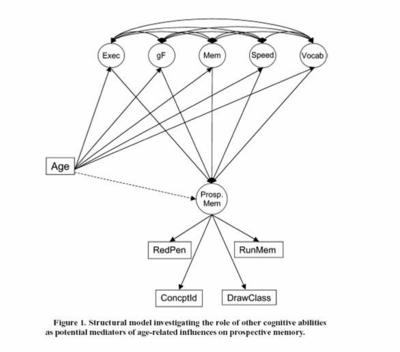
What is "prospective memory" and is it a CHC narrow ability or a mixture of CHC narrow abilities? Salthouse et al recently published an interesting CFA to help answer these questions and to investigate the importance of prospective memory in aging research. The above SEM path diagram captures the essence of a recent investigation of this construct (see reference citation and abtract below)
According to Satlhouse et al. "(2004:
- "Prospective memory refers to remembering to do something in the future. Although studied only recently, it has become of particular interest to researchers on aging because it may be more important for many aspects of everyday functioning and the ability to live independently than retrospective memory, which concerns information or events from the past. A considerable literature on adult age differences in prospective memory has emerged in the past 10–15 years" (p. 1133).
Salthouse, T. A., Berish, D. E., & Siedlecki, K. L. (2004). Construct validity and age sensitivity of prospective memory. Memory & Cognition, 32(7), 1133-1148.
Abstract
- We administered four prospective memory tasks to 330 adults between 18 and 89 years of age to investigate the relationship among the measures of performance in the four tasks, as well as the relationship of the prospective memory measures to age, other cognitive abilities, and noncognitive factors. The four prospective memory variables were found to exhibit both convergent and discriminant validity, indicating that prospective memory ability appears to represent a distinct dimension of individual differences. The prospective memory construct was significantly related to other cognitive abilities, such as executive functioning, fluid intelligence, episodic memory, and perceptual speed, but it was only weakly related to self-ratings of (primarily retrospective) memory and to personality traits. Although a substantial proportion of the age-related variance on the prospective memory construct was shared with other cognitive abilities, we also found some evidence of unique, statistically independent, age-related influences on prospective memory.
